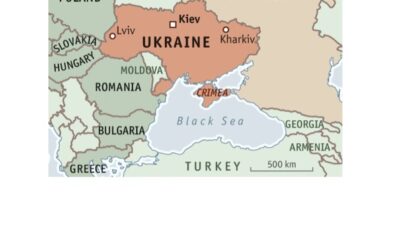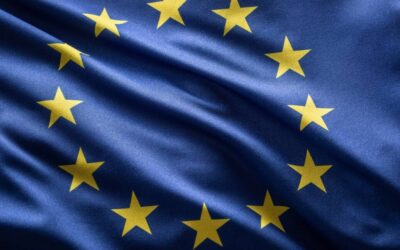Europa Information
A common European information space that takes into account the historical, economic and socio-cultural background of the other member states.
European Union
Geopolitical Challenges
European Culture ?
Of Ground troops and maps
Of Ground troops and maps Much has been written about the broken relationship between Macron and Scholz. DIE ZEIT, the Süddeutsche Zeitung and the Frankfurter Allgemeine Zeitung (FAZ) are not exempt from this. – More than some people in France would like in his former...
Paper is alive – The Budapest Memorandum of 1994
Paper is alive - The Budapest Memorandum of 1994 "Paper is patient" says the popular saying, "Paper is alive" says the historian. Historians have the task of recalling what happened, who acted or who did not act while others did. Particularly in the age of...
The double standards of the 150 days
The double standards of the 150 days Neither the international press nor the governments of Western countries care, but the court decision remains in force, even though the hostages were taken in Israel. The history books will tell our story Order of the International...
In memory of Victoria Amelina
In memory of Victoria Amelina (1 January 1986 - 1 July 2023) After the liberation of Kherson, it wasn't long before Victoria Amelina announced on her Twitter account that she was travelling there to document the Russian war crimes against Ukraine's cultural heritage....
Can one steal the soul of a nation?
Europe, Ukraine and culture It is well known that Jean Monnet (1888-1979), the father of the idea of European unification, believed that if he had to start his great project all over again, he would not begin with coal and steel, but with culture. In fact, long before...
The European Union, how it works
The European Union, how it works European Union - Who decides and how? https://www.europarl.europa.eu/infographic/legislative-procedure/index_fr.html During the 2019 election campaign for the European Parliament, it was striking how little citizens know about the...
Who are we?

Who we are ?
After his studies in contemporary history, political science and his doctorate in political philosophy, Dr. Thomas Häringer, former civil servant of the state of Baden-Württemberg with 30 years of experience in Brussels, is the coordinator of our team. His work in political philosophy raises the questions of how ethical norms can be justified in politics and, in contrasting Max Weber and Raymond Aron, how we can learn from history.
André Specht is a journalist with Alsatian roots.
Our team is strengthened by Italian and Irish experts with different backgrounds and expertise in European affairs.
What we do
We come from different backgrounds and nationalities and realise that there is no common information space in the European Union.
Our work is aimed at European citizens who recognise with us the damaging limitations of language barriers in Europe. We also address journalists and political actors in the different institutions who are looking for information that is verified not only in terms of content but also in terms of information in the other EU member states.
Our aim is to create a true common European information space that takes into account the historical, economic and socio-cultural backgrounds of the other member states.
If our contribution serves to improve mutual understanding within the political groups, e.g. in the European Parliament, or to make the positions of the member states transparent for journalists who are always under pressure from editors and deadlines, then the European Union will grow more together.
It is fair to ask why this information space has not existed for a long time.
The reasons still lie in the lack of language skills of journalists that could allow them to know and assess the information situation in other European member states themselves, without the quantitative or content filters of agencies.
Another reason is the lack of language skills among people at management level in ministries, whose task it would be to work with political decision-makers in a way that actually opens up competent and open options for action and prepares their decisions. Even in the case of technologically or scientifically complex decision-making fields, there is no obligation to demonstrate that specialist expertise has been obtained or involved before submitting a draft ministerial decision.
If political decision-makers increasingly rely on citizen participation without having it accompanied by a close-meshed and simultaneous fact-checking process, the question must be asked whether citizens as mandate and responsibility givers should relieve political decision-makers as responsibility takers. In doing so, they are not asked in advance whether they even want this return package of political responsibility.
The current European reality of journalism education and the training of decision-makers and their staff is rather heterogeneous in the member states of the European Union. In larger member states like Germany, France and Italy, the lack of language skills is compounded by the experience of deeper perspectives in other member states.
For a young German to study the history of Germany in France, meeting English and Italians in addition to French in his study group, has a lasting effect of broadening horizons that is hard to measure. The same applies to young Frenchmen who get to know Napoleon and his campaigns in Italy.
The training systems and the criteria of the selection procedures confirm views of political decision-makers that are no longer up to the requirements and questions in dynamically developing European problem areas.
Federalism and decentralisation are of central importance for the understanding of decision-making processes relevant to Europe. – Federalism and decentralisation carry in themselves opposing movements. This is just as unfamiliar in French training schools for top civil servants as it is in faculties of law in German-speaking countries. The inapplicability of pure categories from German legal education when it comes to the exclusive and binding jurisdiction of the European Court of Justice, when so decided by the federal government with the consent of the parliament as representative of the sovereign, is another example.
Our Subjects
Our issues
We focus on current European issues with long-term implications.
The European Union, its functioning, and its future
- Solidarity and subsidiarity: as a creative engine for concepts.
- The non-perception of the EU institutions.
- The 2024 elections to the European Parliament.
The geopolitical challenges
- The war on the European continent
- The confrontation between authoritarian systems and democracies
- The deficit of common space of reflexion in democracies.
The European culture?
- A European political philosophy?
- A Europe of shared emotions?





